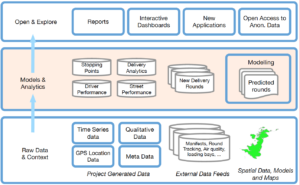A new research paper from the UK present a vision of how ICT can be leveraged to help combat the impact on pollution, congestion and carbon emissions contributed by the parcel delivery sector. This is necessary given the growth in parcel deliveries, especially same-day deliveries, and light commercial vehicles and the need to inform initiatives for cleaner city logistics.
Data
The paper presents data on parcel logistics in Central London, using a data set of parcel manifests spanning 6 months. To understand the impact of growing e-commerce trends on parcel deliveries the research provides a mixed methods case study leveraging data-driven analysis and qualitative fieldwork to demonstrate how ICT can uncover the impact of parcel deliveries on delivery drivers and their delivery rounds during peak-seasonal deliveries.
Failed deliveries
Failed deliveries (15 percent of the deliveries) are another area where improvements may be made. In many cases it is the sender of the goods who demands a certain delivery requirement of the carrier but this does not necessarily match the customer requirement.
Loading and unloading
Local authorities need to rethink the way in which kerbside space is allocated and give greater consideration of urban freight user needs. The analyses are starting to demonstrate the potential benefits of parcel carrier manifest data for investigating peaks in temporal and spatial demand and resulting vehicle activity.
Identifying hot spots and peaks in parcel demand tells only part of the story. Working with delivery drivers and industry partners it is clear that the deliver drivers, their decisions about where to park and walk, and how they plan their route play key roles in the effectiveness of deliveries in the last mile
ICT for sustainability
The paper discusses key opportunities for intervention and further research in ICT4S (ICT for sustainability) and co-created Smart Cities, connecting the findings with existing research and data as a call to the ICT community to help tackle the growth in carbon emissions, pollution and congestion linked to parcel deliveries.
New vehicle technology
Changes in inner city regulation and policy is creating an opportunity for `clean last mile’ services by encouraging more sustainable vehicles. A challenge arising from this is rethinking how to do last mile logistics utilising alternative vehicles (e.g. cargo bikes, eBikes). Part of rethinking the last mile requires new understanding of how these vehicles are restricted in terms of the number of parcels that can be moved quickly in cities, alongside how these new vehicles impact delivery times and how stopping locations and loading bay need to evolve for new vehicles. This requires in integrated approach.

